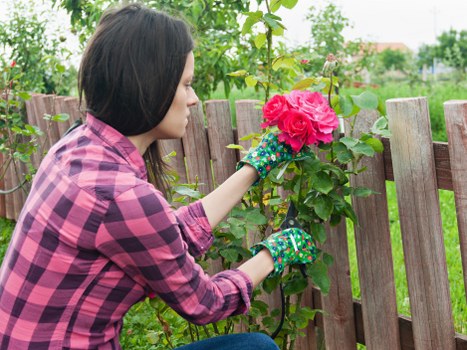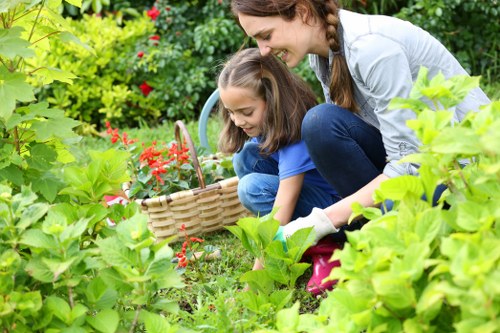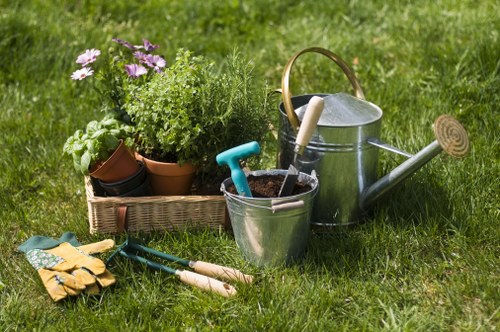Comprehensive Guide to Garden Maintenance in Stoke Newington
Introduction to Garden Maintenance

Maintaining a beautiful garden in Stoke Newington requires a blend of dedication and the right knowledge. Whether you're a seasoned gardener or a beginner, understanding the fundamentals of garden maintenance is essential for cultivating a thriving outdoor space.
Stoke Newington's unique climate and soil conditions necessitate specific care techniques to ensure your garden flourishes throughout the year.
In this article, we will explore various aspects of garden maintenance tailored to the needs of Stoke Newington residents.
Understanding Stoke Newington's Climate

The climate in Stoke Newington is characterized by mild summers and cool winters, with moderate rainfall distributed fairly evenly throughout the year. This temperate climate allows for a diverse range of plants to thrive, but it also requires specific maintenance strategies to address seasonal changes.
During the spring and summer months, gardens benefit from increased sunlight and longer days, promoting vigorous plant growth. Conversely, the autumn and winter seasons necessitate protection against frost and reduced sunlight.
Adapting your garden maintenance routines to these seasonal variations is crucial for sustained garden health.
Soil Preparation and Health

Healthy soil is the foundation of any successful garden. In Stoke Newington, the soil often ranges from clay to loamy, each type presenting its own set of challenges and benefits.
Soil Testing: Regular soil testing helps determine nutrient levels and pH balance, allowing for informed adjustments to enhance soil fertility.
Organic Matter: Incorporating organic matter such as compost improves soil structure, drainage, and nutrient content, fostering a robust root system for your plants.
Plant Selection and Care

Choosing the right plants is pivotal for a sustainable garden. Consider native species that are well-adapted to Stoke Newington's climate, as they require less maintenance and are more resilient against local pests and diseases.
Popular choices include perennials like lavender, roses, and hydrangeas, which offer vibrant colors and year-round interest.
Regular pruning and deadheading encourage healthy growth and prolong blooming periods, enhancing the overall aesthetic of your garden.
Irrigation and Water Management

Efficient irrigation is key to maintaining a lush garden in Stoke Newington. Drip irrigation systems provide targeted watering, reducing water waste and ensuring that plants receive the right amount of moisture.
Mulching is another effective technique that helps retain soil moisture, suppress weeds, and regulate temperature, creating a more conducive environment for plant growth.
Implementing a regular watering schedule, especially during dry spells, ensures that your garden remains vibrant and healthy throughout the year.
Pest and Disease Management
Gardens are susceptible to various pests and diseases that can hinder plant growth and overall garden health. Identifying and addressing these issues promptly is essential for effective garden maintenance.
Integrated Pest Management (IPM): This approach combines biological, cultural, and chemical methods to control pest populations while minimizing environmental impact.
Regular monitoring and maintaining plant health can prevent the outbreak of common garden pests such as aphids, slugs, and beetles.
Seasonal Garden Maintenance Tasks
Adapting your garden maintenance routine to the changing seasons ensures that your garden remains in top condition year-round.
- Spring: Planting new seeds, pruning dormant trees, and preparing soil for new growth.
- Summer: Regular watering, weeding, and harvesting vegetables and herbs.
- Autumn: Clearing fallen leaves, planting perennials, and preparing plants for winter.
- Winter: Protecting plants from frost, planning for the next season, and maintaining garden tools.
Each season presents unique challenges and opportunities for enhancing your garden's beauty and productivity.
Hardscaping and Garden Structures
Incorporating hardscaping elements like paths, patios, and garden furniture adds functionality and aesthetic appeal to your garden.
Proper placement and maintenance of these structures enhance the overall design and usability of your outdoor space.
Regular cleaning and repairs ensure that these elements remain safe and visually pleasing throughout the year.
Pruning and Trimming Techniques
Pruning is essential for maintaining the shape, health, and productivity of your plants. Effective pruning techniques vary depending on the type of plant and its growth habits.
For flowering shrubs, remove dead or diseased branches to promote better air circulation and sunlight exposure.
Tree pruning involves selective cutting to remove unwanted branches, enhancing the tree’s structure and longevity.
Organic Gardening Practices
Embracing organic gardening practices ensures a sustainable and environmentally friendly approach to garden maintenance.
Using natural fertilizers, compost, and organic pest control methods reduces the reliance on chemical inputs, promoting healthier plants and soil.
Additionally, organic practices support local biodiversity, attracting beneficial insects and wildlife to your garden.
Maintaining Garden Tools and Equipment
Well-maintained tools are crucial for efficient garden maintenance. Regular cleaning, sharpening, and proper storage extend the lifespan of your gardening equipment.
Investing in high-quality tools ensures better performance and reduces the risk of injury during maintenance tasks.
Organizing your tools systematically makes it easier to access them when needed, streamlining your gardening workflow.
Creating a Sustainable Garden
A sustainable garden minimizes environmental impact while maximizing resource efficiency. Incorporate native plants, use water-efficient irrigation systems, and practice composting to reduce waste.
Implementing rainwater harvesting systems can provide a natural and cost-effective water source for your garden.
Promoting biodiversity by planting a variety of species supports ecosystem balance and resilience.
Professional Garden Maintenance Services
For those seeking expert assistance, professional garden maintenance services in Stoke Newington offer comprehensive solutions tailored to your garden’s specific needs.
Experienced gardeners provide services ranging from regular lawn care and pruning to landscape design and seasonal clean-ups.
Hiring professionals ensures that your garden receives the attention and care required to maintain its beauty and functionality.
DIY Garden Maintenance Tips
While professional services are invaluable, there are several DIY maintenance tasks that can help you manage your garden effectively.
- Regular Weeding: Keep your garden beds free from weeds to reduce competition for nutrients.
- Mulching: Apply mulch to conserve moisture and suppress weed growth.
- Composting: Create homemade compost to enrich your soil naturally.
- Plant Rotation: Rotate crops each season to prevent soil depletion and reduce pest infestation.
Implementing these tips can enhance your garden’s health and reduce the workload involved in maintaining it.
Choosing the Right Fertilizers
Selecting the appropriate fertilizers is vital for providing essential nutrients to your plants. Organic fertilizers like compost and manure improve soil fertility without harming the environment.
Chemical fertilizers offer quick nutrient delivery but should be used sparingly to avoid soil degradation and plant damage.
Understanding the specific needs of your plants helps in choosing the right fertilizer type and application frequency.
Landscape Design and Planning
Effective landscape design enhances the functionality and beauty of your garden. Incorporate elements like seating areas, water features, and color-coordinated plantings to create a harmonious outdoor space.
Planning your garden layout, considering factors such as sunlight exposure and soil type, ensures that each plant thrives in its designated spot.
Seeking inspiration from local gardens in Stoke Newington can provide ideas tailored to the region’s climate and aesthetic preferences.
Seasonal Planting Schedules
Implementing a seasonal planting schedule ensures continuous growth and bloom throughout the year. In Stoke Newington, timing is crucial to align with the local climate conditions.
Plant spring bulbs like tulips and daffodils in autumn for vibrant spring blooms.
Summer planting includes heat-tolerant vegetables and annual flowers that thrive in warmer temperatures.
Lawn Care and Maintenance
A well-maintained lawn is a cornerstone of any garden. Regular mowing, aeration, and fertilization keep your grass healthy and lush.
Addressing issues like pests and diseases promptly prevents lawn deterioration and maintains its aesthetic appeal.
Choosing grass varieties suitable for Stoke Newington’s climate ensures a resilient and low-maintenance lawn.
Introduction to Composting
Composting transforms organic waste into nutrient-rich soil amendments, promoting sustainable garden practices.
Set up a compost bin in your garden to recycle kitchen scraps, yard waste, and other organic materials.
Regular turning and monitoring moisture levels accelerate the composting process, resulting in high-quality compost for your plants.
Plant Propagation Techniques
Propagating plants can help expand your garden without the need for purchasing new plants. Common propagation methods include:
- Cuttings: Rooting stem or leaf cuttings to produce new plants.
- Division: Splitting mature plants into smaller sections for propagation.
- Seed Sowing: Growing plants from seeds for a diverse garden.
Each technique requires specific conditions and care to ensure successful plant growth.
Mulching Practices
Mulching is a vital practice in garden maintenance that offers multiple benefits. It helps retain soil moisture, suppresses weed growth, and regulates soil temperature.
Organic mulches like bark, straw, and leaf litter enrich the soil as they decompose, providing additional nutrients to your plants.
Applying mulch correctly involves ensuring an appropriate layer thickness and avoiding direct contact with plant stems to prevent rot.
Integrated Garden Management
Integrated garden management combines various maintenance practices to create a balanced and sustainable garden ecosystem.
This approach includes soil management, pest control, plant selection, and water conservation, working together to maintain garden health.
Adopting integrated management fosters resilience against environmental stresses and promotes long-term garden sustainability.
Attracting Beneficial Wildlife
A garden teeming with beneficial wildlife enhances biodiversity and natural pest control. Planting flowers that attract pollinators like bees and butterflies supports ecosystem balance.
Installing birdhouses and bat boxes encourages the presence of natural predators that keep pest populations in check.
Creating diverse habitats within your garden fosters a thriving environment for various beneficial species.
Using Sustainable Materials
Incorporating sustainable materials in your garden layout reduces environmental impact and promotes eco-friendly practices.
Opt for recycled or locally-sourced materials for paths, fences, and garden structures to minimize your carbon footprint.
Choosing durable and low-maintenance materials ensures longevity and reduces the need for frequent replacements.
Maintaining Garden Paths and Walkways
Garden paths and walkways enhance accessibility and aesthetic appeal. Regular maintenance involves clearing debris, repairing damaged sections, and preventing weed growth.
Selecting appropriate materials, such as gravel, stepping stones, or wood, complements your garden’s overall design.
Proper planning and maintenance ensure that paths remain functional and visually appealing throughout the year.
Pruning Flower Beds
Flower beds require regular pruning to remove dead or overgrown blooms, encouraging continuous flowering and healthy plant growth.
Deadheading spent flowers prevents the plant from diverting energy into seed production, fostering new blooms.
Maintaining the shape and size of flower beds contributes to the overall organization and beauty of your garden.
Creating Seasonal Displays
Seasonal displays add dynamic beauty to your garden, highlighting different plants and blooms throughout the year.
Incorporate a variety of plants that bloom in different seasons, ensuring a colorful and engaging garden space all year round.
Strategically placing seasonal decorations and focal points enhances the visual interest and thematic consistency of your garden.
Final Thoughts on Garden Maintenance
Effective garden maintenance in Stoke Newington involves a combination of proper planning, consistent care, and sustainable practices. By understanding the local climate, soil conditions, and plant needs, you can cultivate a garden that is both beautiful and resilient.
Whether you choose to manage your garden independently or seek professional services, maintaining your garden requires dedication and a proactive approach.
Embrace the joy of gardening and transform your Stoke Newington garden into a vibrant and thriving outdoor sanctuary.
Contact us today to book your garden maintenance service and ensure your garden remains stunning and well-kept all year round.

